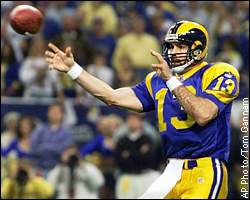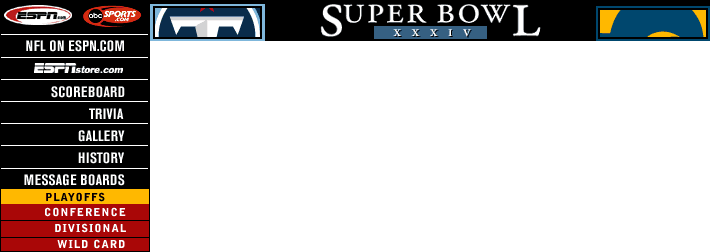ATLANTA -- He had thrown all of 11 passes in his NFL career before the season began. He was supposed to be the backup. His team, which won four games a year ago, was supposed to stink.
|  |
|
| Kurt Warner has authored a feel-good story that's right out of a Hollywood script. |
And now, less than five months later, the league MVP has that team here in Super Bowl XXXIV.
Not only has St. Louis Rams quarterback Kurt Warner come out of nowhere, he has gone somewhere farther and faster than any athlete in major sports history. We have followed his ridiculous storyline all season long, so it no longer takes our breath away. But step back, exhale and ponder.
On Sunday, Warner was under the extreme duress of the Tampa Bay defense, and yet he found a way to get it done. His 30-yard touchdown pass to Ricky Proehl, a sweet little slice of Arena Football League ingenuity, beat the Buccaneers 11-6 and delivered the Rams to only their second game adorned with Roman numerals.
Dan Marino's magnificent 1984 season produced more NFL touchdown passes, and he was a first-round draft choice playing his second season for a Super Bowl-caliber team.
Sometimes, in the whirling vortex of life we don't always see everything in the cold context of history. Well, where to rank Warner's unlikely achievement?
| STRANGER THAN FICTION |
| Sports history is filled with great rags-to-riches stories. How else would we know athletes like Bucky Dent, John Daly, Brian Doyle, Doug Williams, Billy Mills or Francis Ouimet?
But in the wake of Kurt Warner's Super Bowl season with the Rams, ESPN.com went searching for the best individual Cinderella story in sports history.
Check out the choices of ESPN.com users. |
At the very, very top.
I know, I know. In this season of numbing introspection, in a century-closing year when lists of the best and the brightest athletes included horses and, in one case, a sportswriter, we tend too easily toward myopia.
Is Michael Jordan really the greatest athlete of the century, or did he just happen to dominate the most recent decade? Was Muhammad Ali really one of the very best, or did he strike a charismatic chord with the 50-something majority of the voters?
With all due respect to Jordan and Ali, Kurt Warner is an athlete from our very midst who might never be rivaled for precocity. Kevin Jackson, ESPN.com's NFL editor, posed the question a week ago, and it has haunted me ever since: Who went from zero to 60 quicker, classier than Warner?
I have canvassed friends and colleagues for nearly a week now, and the best candidates they can manage are actually fictional characters. As wonderful as Robert Redford was in the role of Roy Hobbs, "The Natural" was a product of the celluloid art of fiction. Joe Hardy, who sold his soul to the devil so he could star for his beloved Washington Senators, was a figment of the playwright's fertile mind in "Damn Yankees."
Sure, rookie Magic Johnson led the Los Angeles Lakers to the NBA title in 1979-80 and was the MVP of the Finals when he played center against the Philadelphia 76ers for ailing Kareem Abdul-Jabbar. Johnson scored 42 points and added 15 rebounds, seven assists and three steals, but it's not like people didn't see him coming. Johnson was the first pick of the draft and coming off an NCAA championship at Michigan State.
Usually 250 players are drafted each year by the NFL, but no one took Warner out of Northern Iowa in 1995. Maybe it was because he only started at that obscure school for his senior season.
Larry Bird, who carried Indiana State into that final against Johnson, had a huge impact in his first season. The Boston Celtics went from 29-53 to 62-21 in 1979-80, with Bird averaging 21 points and 10 rebounds. But, he too, was destined for greatness.
Eric Dickerson ran for 1,808 yards as a rookie in 1983, but the Los Angeles Rams lost to the Washington Redskins 51-7 in the second round of the playoffs. That same season Dan Marino threw 20 touchdown passes in nine starts, but the Dolphins lost to Seattle in the first round of the playoffs. Rookie Randy Moss caught 17 touchdown passes last year for the Minnesota Vikings, but they were erased by Atlanta in the NFC Championship Game.
Dickerson, Marino and Moss didn't surprise people the way Warner has; they were all first-round draft choices.
How about Fred Lynn, whose rookie season with the Red Sox earned him the American League's MVP Award. He hit .331, 21 home runs, 105 RBI and 103 runs scored. Boston made it all the way to the World Series but lost in seven games to Cincinnati. But again, Lynn was seen as a future star. Besides, teammate Jim Rice (.309, 22 homers, 102 RBI) was almost as good.
The best I can do is this:
In 1913, 20-year-old amateur golfer Francis Ouimet stunned veteran British stars Harry Vardon and Ted Ray to win the U.S. Open in a three-way playoff. But the venue, The Country Club in Brookline, Mass., was familiar to Ouimet, who had caddied there. And at the time, the U.S. Open did not draw a field as deep and talented as today.
Playing Arena Football with the Iowa Barnstormers, Warner was about as familiar with the NFL as, say, Hillary Clinton is with New York.
When Trent Green was lost with a season-ending knee injury, Warner became the starter and, basically, he threw the lights out. He completed a league-best 65.1 percent of his passes, a ridiculous number considering the Rams throw the ball farther down the field (8.72 yards on average) than any other team. He threw 41 touchdown passes in the regular season, the first quarterback not named Marino to clear 40. His passer rating of 109.2 was among the best handful of single-season efforts.
In the playoffs, against the Minnesota Vikings, Warner proved he was no fluke. In his first NFL postseason game he completed 27 of 33 passes, (81.8 percent), the third-best percentage in postseason history. His very first pass went for a 77-yard touchdown. He finished with five TD passes, tying the third-best total ever. His passer rating was 142.99, history's eighth-best figure.
And while he was shut down by the Tampa Bay defense Sunday, throwing three uncharacteristic interceptions, Warner did manage to make the game-winning play, a deft ball to Proehl, who ran a fade route.
Warner stands on the threshold here in Atlanta. If he carries the Rams to victory in Super Bowl XXXIV on the fast track of the Georgia Dome that reminds the Rams so much of home, people will wonder if, like Joe Hardy, Warner sold his soul to the devil.
There might be no other way to explain it.
Greg Garber is a regular contributor to ESPN.com. His column will appear every day during Super Bowl week.

